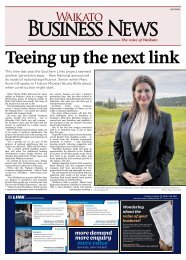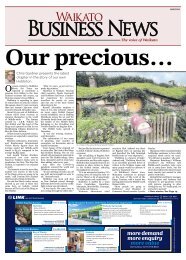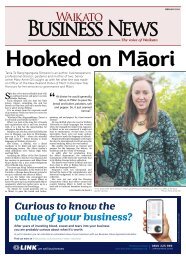Waikato Business News | March 1, 2024
Create successful ePaper yourself
Turn your PDF publications into a flip-book with our unique Google optimized e-Paper software.
10 MARCH <strong>2024</strong><br />
There has always been great<br />
rivalry, and comradery,<br />
between New Zealand and<br />
Australia. Such competition,<br />
currently continuing on the cricket<br />
pitch, also extends to the world<br />
of migration. In the year to June<br />
2023 Australia had a net migration<br />
gain of 518,000 people, while New<br />
Zealand recorded a gain of 126,000<br />
people in the year to December<br />
2023. During this year New Zealand<br />
also had a net loss of 47,000 NZ<br />
citizens, with over half moving to<br />
Australia.<br />
There are many factors for<br />
migrants to consider when looking<br />
to move “down-under”, with the<br />
two countries’ immigration policies<br />
a primary factor. For families<br />
looking to make a permanent<br />
move, their focus is on obtaining<br />
resident visas which allow then to<br />
live indefinitely in the country, and<br />
to potentially become citizens.<br />
Both countries have skilled<br />
residence programmes to attract<br />
qualified workers and to fill<br />
workforce gaps, and have similar<br />
requirements for good health,<br />
character and English language.<br />
So, what are the main differences<br />
between New Zealand and<br />
Australia’s skilled resident visa<br />
policies?<br />
New Zealand’s flagship workbased<br />
residence visa is the pointsdriven<br />
Skilled Migrant Category<br />
(SMC) for which points can be<br />
claimed for qualifications or<br />
occupational registration or high<br />
income, and additional points<br />
for up to 3 years of NZ skilled<br />
work experience. There are also a<br />
number of skill-shortage roles on<br />
the Green List Tier 1, which can<br />
enable a straight-for-residence<br />
application (no points required).<br />
Additional roles on the Green<br />
List Tier 2, and in some sectors<br />
(eg: care workforce) also provide<br />
a pathway to residence after 2<br />
years of work. All applications<br />
require skilled employment in New<br />
Zealand.<br />
Australia has a large number of<br />
work-based Permanent Residence<br />
visa categories, with many different<br />
streams fed into by different<br />
categories of temporary visas.<br />
The main, and more streamlined,<br />
permanent visa options are visa<br />
ADVERTORIAL<br />
New Zealand v Australia<br />
– with immigration also!<br />
subclasses 189, 190 and 186 (Direct<br />
Stream). Subclasses 189 and 190<br />
are points-driven with a more<br />
complex points system than New<br />
Zealand’s SMC. While New Zealand<br />
requires every applicant to have<br />
skilled employment, this is not the<br />
case in Australia, where there are<br />
options for state-sponsorship and<br />
recognition of skills/contribution<br />
which do not require employment.<br />
Two other significant differences<br />
between the countries’ skilled<br />
residence policies relate to age,<br />
and long-term residence. New<br />
Zealand residence applicants must<br />
Both countries have<br />
skilled residence<br />
programmes to<br />
attract qualified<br />
workers and to fill<br />
workforce gaps.<br />
be under 56 years when applying,<br />
while applicants for Australian<br />
residence must generally be under<br />
45 years. New Zealand applicants<br />
are also normally issued with<br />
Resident Visas which allow travel<br />
as a resident for 2 years initially and<br />
then there is the ability to obtain a<br />
Permanent Resident Visa – a PRV<br />
is a lifelong residence visa with no<br />
expiry date. In contrast Australia<br />
issues a 5 year “permanent resident<br />
visa” which must be renewed every<br />
5 years. New Zealand resident visa<br />
holders are also eligible to vote in<br />
general elections, which is not the<br />
case in Australia.<br />
Another key difference is in<br />
the criteria to become citizens. In<br />
Australia a person must hold a valid<br />
visa for 4 years with the last year<br />
as a permanent resident, whereas<br />
New Zealand requires someone to<br />
have been a resident for 5 years.<br />
So, while the Trans-Tasman<br />
rivalry continues on the cricket<br />
pitch, and the rugby fields, it also<br />
continues with our immigration<br />
policies as both countries seek<br />
to attract much needed skilled<br />
migrants.<br />
YOUR BUSINESS<br />
How to avoid a<br />
world of pain<br />
By JOSH MOORE<br />
If I asked you to think of someone that<br />
you’ve met at a networking event in the last<br />
year, who you would love to have as a client,<br />
who would that be?<br />
Now imagine this: That person is sitting<br />
on their couch this Saturday afternoon,<br />
and a notification pops up on their phone<br />
telling them you’ve sent them a message via<br />
LinkedIn or Facebook. But the problem is,<br />
you haven’t.<br />
Instead, your account has been hacked,<br />
and the hacker is now messaging all of<br />
your connections on LinkedIn or Facebook,<br />
looking for who they can suck in, as they<br />
pretend to be you.<br />
By the time you find out, it is too late.<br />
They’ve changed your password and have<br />
locked you out of your account.<br />
Your connections are now receiving weird<br />
messages from you, perhaps pushing some<br />
product they could buy online, or asking for a<br />
quick loan to get you out of fix. Whatever the<br />
hacker sends, it’s damaging your reputation.<br />
This isn’t a fictitious story. It happened to<br />
a friend of mine who is a sales rep. Months<br />
later, the hacker is still sending messages to<br />
her contacts, trying to suck people in.<br />
Two other business owners I know had<br />
the same thing happen to them, but with the<br />
added problem of losing access to their entire<br />
business profiles on Facebook and Instagram,<br />
because they were the only administrator on<br />
the page. Both had worked hard to build<br />
up their social media presence, which had<br />
become a good source of leads and brand<br />
OUR ENVIRONMENT<br />
awareness. They lost access overnight.<br />
This horrible situation happens more<br />
often than you might realise, but is easily<br />
avoidable. Here’s how to make sure this does<br />
not happen to you:<br />
Firstly, and most importantly, make sure<br />
that you have Two Factor Authentication<br />
(2FA) turned on for your social media<br />
accounts. You’ll use an authentication app,<br />
such as Microsoft Authenticator, which<br />
provides a six-digit code that changes every<br />
30 seconds. You’ll then need both a password<br />
and the six-digit authentication code to login<br />
to your account, which stops hackers from<br />
getting into your account, even if they know<br />
the password.<br />
If you don’t have this setup, when your<br />
account gets hacked, the hacker will setup<br />
2FA using their own device. This stops you<br />
from being able to get back into the account,<br />
and you’ve then probably lost your account<br />
forever.<br />
Secondly, for any social media business<br />
profile pages you have, make sure you<br />
have more than one person assigned as an<br />
administrator. That way, if your account was<br />
to get hacked, you’ll have someone else who<br />
still has administrator access to the business<br />
profile. For Facebook, the best way to do this<br />
is to setup Facebook <strong>Business</strong> Manager, and<br />
assign your staff access from there.<br />
With these simple steps, you can save<br />
yourself from a world of pain.<br />
• Josh Moore Marketing Director at<br />
Duoplus<br />
Let’s talk<br />
about it By PHIL MACKAY<br />
This column doesn’t relate to my ‘built<br />
environment’ remit, at least not directly.<br />
Rather I would like to share an idea.<br />
I’ve attended several conferences and<br />
events lately and observed common<br />
themes. On the one hand there is a sense<br />
of concern around government debt and<br />
levels of spending. On the other, we have<br />
an infrastructure deficit in the hundreds of<br />
billions of dollars, the result of decades of<br />
underinvestment.<br />
The main conclusion drawn by speakers<br />
has been that in order to address the<br />
infrastructure deficit without spending<br />
excessively, we need to achieve better<br />
value-for-money (and also that it doesn’t<br />
all need to be funded by taxpayer money,<br />
but that’s a whole other article).<br />
The consensus seems to be that one way<br />
of achieving this is by having a more stable,<br />
predictable pipeline of infrastructure<br />
projects, and to avoid wasteful changes of<br />
direction.<br />
A recent example is the scrapping of<br />
the project to replace Cook Strait ferries,<br />
having already spent $424M. Without<br />
arguing whether it was a good decision, this<br />
shows the inefficiency of political decisionmaking<br />
around infrastructure.<br />
Unfortunately, our politics are becoming<br />
more divided, and political discourse less<br />
productive. Social media is exacerbating<br />
existing divisions, and eroding our<br />
collective ability to make societal progress.<br />
As a society, we need to address this<br />
challenge, or things will get worse rather<br />
than better. Arguing our own points of<br />
view online is unlikely to help us move<br />
forward. It’s reasonably well documented<br />
that humans are good at ignoring<br />
information that contradicts our own<br />
point of view. Rather, if we recognise that<br />
we need to broaden our perspectives in<br />
order to achieve more productive political<br />
discourse, a good way to do this is to have<br />
a personal conversation with someone who<br />
has a different opinion to our own.<br />
In 2017, Jochen Wegner and the team<br />
from Zeit Online, an online German<br />
newspaper, realised this and began a<br />
project to see what would happen if they set<br />
up some conversations between strangers<br />
with differing views on key issues. When<br />
1000 people signed up in the first day for<br />
what was then called “Deutschland spricht”<br />
or “Germany Talks” they knew they were on<br />
to something.<br />
Following several iterations of Germany<br />
Talks, “Europe Talks” was launched,<br />
bringing 17,000 people from 33 countries<br />
together in the spring of 2019 to have<br />
conversations with strangers and broaden<br />
their perspectives.<br />
More recently The Guardian has been<br />
running a regular column called “Dining<br />
across the divide” where they send two<br />
people who have opposing political views<br />
out for dinner. The aim is to find out<br />
whether meeting in person over a meal can<br />
bridge divides.<br />
If New Zealand is to meaningfully<br />
address some of our long-term challenges –<br />
infrastructure, health, and housing to name<br />
a few – we cannot afford to waste time and<br />
money changing plans and direction, we<br />
need to find a way to build consensus.<br />
Maybe we need our own version of<br />
“Aotearoa Talks” or “New Zealand Talks”,<br />
the name itself might be a point of some<br />
discussion.<br />
• Phil Mackay is <strong>Business</strong> Development<br />
Manager for Paua Architects

















